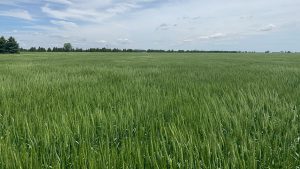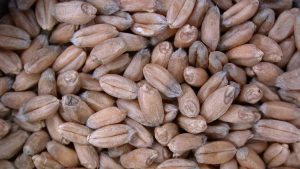Looking back
10 YEARS OF MARKETING
In recognition of Grain Farmers of Ontario’s 10th anniversary, Ontario Grain Farmer is talking to staff about the impact that the organization has made. This month we sat down with Todd Austin, manager of marketing at Grain Farmers of Ontario, to look back at initiatives over the past 10 years.

What impact did the formation of Grain Farmers of Ontario have on the Marketing Department?
Our day to day business really didn’t change with the formation of Grain Farmers of Ontario; but within the organization we are unique in that we are a standalone department. Our funding is not generated through check-off fees. When the merger occurred, an independent wheat marketing fund was created, and that is what is used to fund our marketing activities.
How has the Wheat Pool and other marketing offerings evolved over the past 10 years?
When we started we just had the Wheat Pool and forward contracting at a fixed price. We now offer a basis contract in forward contracting and in the Pool we offer a pre-Pool and post-Pool contract. The pre-Pool is where a farmer agrees to deliver a certain number of tonnes at harvest into the Pool. Our goal with that is to know what we have ahead of time so we can take advantage of more marketing opportunities. The post-Pool contract is for farmers who have on-farm storage but still want to participate in the Pool program.
What have been some of the major market influences over the past 10 years?
Wheat futures and wheat markets aren’t single entities. They are connected to a lot of other markets, especially the corn market. What happens in other markets can affect the wheat market as well.
This past year where we saw acreage ripped up due to poor over-wintering conditions that certainly affected cash prices at harvest time. We saw stronger bids from end-users because they were wanting to make sure they could source enough supply to carry them through the year; there was concern exports would reduce local supplies.
The Canadian dollar has been another significant influence. A couple of years ago we saw the dollar hit parity with the U.S. dollar and that really affected our cash pricing because the Futures market is based in U.S. dollars.
Every year we are looking at the supply and demand for wheat locally and globally, as well as the supply of corn and soybeans because they all inter-relate. But the market is pretty fluid and if one buyer, such as a flour mill, isn’t buying, someone else is.
How has the process of marketing changed over the past 10 years?
We used to call our broker with our order, and sometimes have to wait five minutes before they would call back to get that order filled. Now, more of the Futures trading is done electronically, we can be on the phone with them and do an instant fill. Or with some computer programs you can place the order directly yourself with the Boards of Trade. But we are still on the phone, and we still do a lot of paperwork.
We can now take resting orders and watch the markets, including the overnight markets, for our farmer-members. If it hits their price, we lock in their contract for them.
We are now seeing instantaneous information and we can get global information a lot quicker than we used to. But we still rely on the United States Department of Agriculture reports to understand what is going on in the U.S. There are also independent companies that do their own scouting and compile their own reports. So, there is a lot more to sift through now than there was in the past. Sometimes that makes it harder to do our job, you have to make sure you don’t get bogged down in the data. You can’t second guess your decisions, once you make a trade you have to forget about it because the market can still surprise you even if you have what you think is all the information. The market can be volatile at times.
What are the goals of the Marketing department in the future?
What we offer to the Ontario farmer is a marketing alternative. The Pool program is unique, we try to keep our forward contract program competitive with the market. We are going to continue to offer that.
We are also here to help people in other departments within Grain Farmers of Ontario with our knowledge and expertise. We offer expertise on markets and marketing to our farmer-members, and they don’t necessarily have to sell to us, they can sell to whoever they want. Sometimes our department has to wear two hats, because obviously we would like to buy their wheat, but if we can assist them at getting better value for their wheat sold somewhere else that is a win for everyone as well. •

























